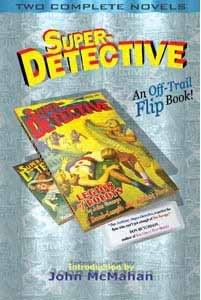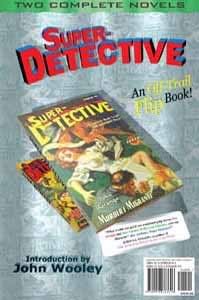Though their 1930s heyday has long passed, the action heroes of pulp mag fiction continue to hold onto a devoted fan base. The Shadow, Doc Savage, The Spider: these are names familiar to most pulp aficionados, though there also was a sizable string of lesser known heroes vying for your dime novel dime back in the day. Among, these, was the "super-detective" Jim Anthony.
Anthony appeared in Trojan Publications' Super-Detective pulp in the early forties, pretty much the twilight of the hero pulp, and two of his adventures have been recently reprinted by the pulp archive specialty house, Off-Trail Publications. The Super-Detective Flip Book is modeled after the old Ace Double paperbacks of the fifties and sixties, though not in as compact a package as the old pocket-sized books. Each "half" of the volume contains an individual Jim Anthony novel – though calling a 52-page story a "novel" is perhaps stretching things – representing two different phases of the character's short-lived career.
The first version of Jim Anthony, the creation of prolific pulp writer Victor Rousseau, was a Doc Savage-styled action hero: a scientist/detective genius whose mother, we're regularly reminded, was the daughter of a Commanche chief. This background gave Jim the uncanny ability to sense danger ahead of time (because said ability obviously worked so well for Native Americans when the Euro settlers came), while his inventive genius provided him with the capacity to quickly cobble together defenses against anything some super-villain might throw at him. Much as the Shadow had his cadre of helpers operating throughout the city, Anthony is aided in his fight against evil by a core of loyal employees operating out of headquarters in the Catskills.
 Brainy super-guy Anthony's reprinted adventure, "Legion of Robots," first appeared in the November 1940 issue of Super-Detective. Despite its misleading title, "Robots" features no mechanical men, just zombified human who've been given super-strength by a recurring maniacal villain named Rado Ruric. At the request of a desperate South American dictator, our hero flies down to the country of San Rossario, which appears to be beset by a smoke-breathing sea serpent. It's not giving much away to reveal that the serpent proves mechanical and that Ruric uses it and an army of zombified Hindus to attack his mortal enemy Anthony. Midway into the story, the action returns to the states, where Anthony practically drops out of the story altogether – and the focus shifts to several of his henchmen, most specifically the lovelorn pilot Tom Gentry. Ruric's evil scheme is foiled, of course.
Brainy super-guy Anthony's reprinted adventure, "Legion of Robots," first appeared in the November 1940 issue of Super-Detective. Despite its misleading title, "Robots" features no mechanical men, just zombified human who've been given super-strength by a recurring maniacal villain named Rado Ruric. At the request of a desperate South American dictator, our hero flies down to the country of San Rossario, which appears to be beset by a smoke-breathing sea serpent. It's not giving much away to reveal that the serpent proves mechanical and that Ruric uses it and an army of zombified Hindus to attack his mortal enemy Anthony. Midway into the story, the action returns to the states, where Anthony practically drops out of the story altogether – and the focus shifts to several of his henchmen, most specifically the lovelorn pilot Tom Gentry. Ruric's evil scheme is foiled, of course.
"Murder's Migrants," published three years later, gives us a different Jim Anthony: more the man-about-town amateur detective than the scientist adventurer. In this yarn, crafted by veteran pulpster Robert Leslie Bellem (his name would later pop up as a writer on the original Perry Mason teleseries) and Willis Todhunter Ballard, our hero has to track down the mind behind a vicious scheme to undermine wartime industry. Trucking unemployed workers out into the middle of the southwest desert with the promise of factory work – then leaving 'em to die – these fifth columnists aim to sully Anthony's name as a good decent wartime capitalist. Complicating the story is an obese blackmailing publisher named L. Gabriel Stope, a Caspar Guttman-styled figure who may or may not have the writers' not-so-sly slam at their publishers.
"Migrants" is plain "grown-up" detective fiction, though most readers will almost immediately identify the guilty party. Pilot Tom Gentry also shows up, the only cast member to have apparently survived the change in focus, only here his primary function is to ogle pretty girls and serve the occasional cocktail. The action is less exotic in "Migrants" – no faux "sea serpents" or sinister Hindus, just gunfights with Nazi agents – though our hero's Commanche heritage gets name-checked once again.
 If Jim Anthony never became a pulp superstar, the problem wasn't just his appearance at the tag end of the pulp hero boom. Compared to an over-the-top boy scout like Doc Savage or a sinister adventure like the Shadow, Anthony comes across pretty bland. In "Robots," all of the engaging character work gets handled by his underlings. Tom Gentry's jealousy, sparked by his unsuccessful attempts at wooing new Anthony employee Linda Tabor of Tall Corn, Iowa, provides a major plot point – once again demonstrating how much trouble girls are in the boyish world of hero pulps. In "Migrants," a bickering crew of road-show Maltese Falconers provides all the character coloration.
If Jim Anthony never became a pulp superstar, the problem wasn't just his appearance at the tag end of the pulp hero boom. Compared to an over-the-top boy scout like Doc Savage or a sinister adventure like the Shadow, Anthony comes across pretty bland. In "Robots," all of the engaging character work gets handled by his underlings. Tom Gentry's jealousy, sparked by his unsuccessful attempts at wooing new Anthony employee Linda Tabor of Tall Corn, Iowa, provides a major plot point – once again demonstrating how much trouble girls are in the boyish world of hero pulps. In "Migrants," a bickering crew of road-show Maltese Falconers provides all the character coloration.
As with so many action pulp series, the Super-Detective stories lean heavily on the outlandish inventiveness of their writers, but it was a losing game since super-hero comic books were stealing most of the younger pulp readers. In the end, comics proved a much efficient format for boy's adventure fantasies, while the hard-boiled pulpsters of the Black Mask school (from whence came, of course, Raymond Chandler and Dashiel Hammett) churned out much more satisfying crime fare. But hero pulps have their own unique flavor: an endearingly awkward excited voice ("Even Jim Anthony breathed hard and tightly through his nostrils at the sight of the utterly unbelievable thing that was.") that was often the result of cranking 'em out quickly with spare time for rewrites, a willingness to toss logic out the window for the sake of breathless thrills.
Pulp fans on the lookout on the lookout for fresh faces will probably get a kick out of the Super-Detective Flip Book, though. If Anthony's adventures aren't as violently outré as some of his colleagues', they're still good for a lazy summer afternoon read.
 Blogcritics The critical lens on today's culture & entertainment
Blogcritics The critical lens on today's culture & entertainment



